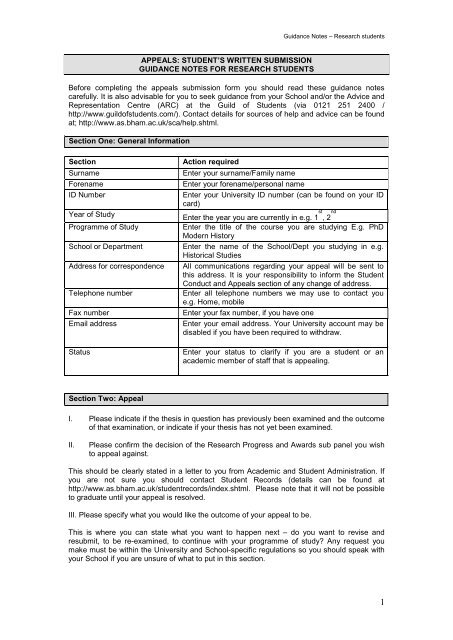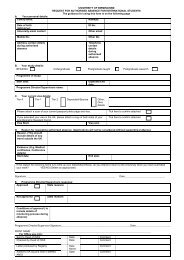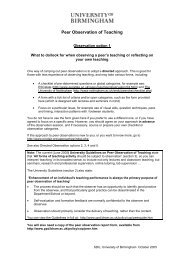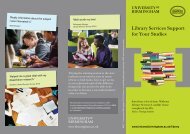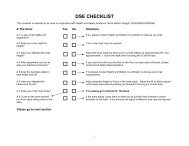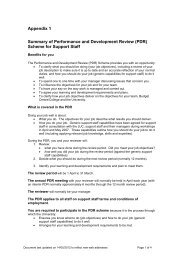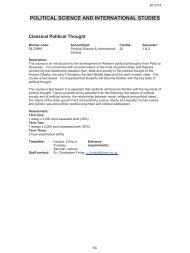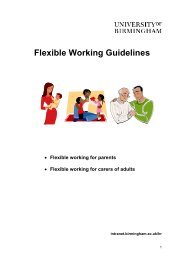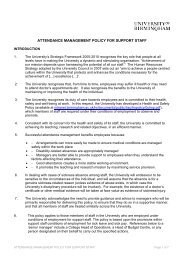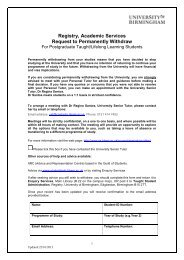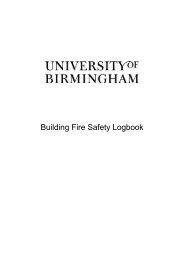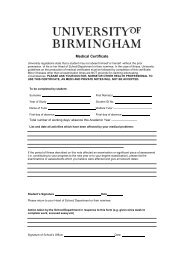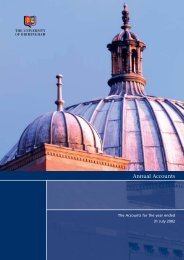Guidance notes for research students (PDF - 78KB)
Guidance notes for research students (PDF - 78KB)
Guidance notes for research students (PDF - 78KB)
- No tags were found...
You also want an ePaper? Increase the reach of your titles
YUMPU automatically turns print PDFs into web optimized ePapers that Google loves.
<strong>Guidance</strong> Notes – Research <strong>students</strong>Section Three: Grounds <strong>for</strong> AppealSection 2 of the Code of Practice outlines the grounds on which you can appeal.You may appeal on the following grounds:• that there were circumstances unknown to the examiners which contributed to student’sacademic per<strong>for</strong>mance and consequently to the progress decision against which theappeal is being made, and the student can present good reason <strong>for</strong> thesecircumstances not having been made known in extenuating circumstances prior to themeeting of the Board of Examiners;(complete section 3A if you wish to appeal on these grounds)• that there was an administrative irregularity or failure in procedure giving rise to areasonable doubt as to whether the progress decision would have been different if ithad not occurred;(complete section 3B if you wish to appeal on these grounds)• that there has been bias in the assessment of their thesis on the part of one or more ofthe examiners. Note that the University’s definition of bias is: An apparent prevention ofobjective judgement by one or more of the examiners. This means that bias only existswhere there is a material and negative connection between the examiner and thestudent which, in the opinion of a fair-minded person, prevents the examiner fromexercising their objective judgement (Adapted from the Office of the IndependentAdjudicator <strong>for</strong> Higher Education, Annual Report 2005).(complete section 3C if you wish to appeal on these grounds)NB <strong>for</strong> appeals arising from reasonable diligence procedures, sections 3A and 3B correspondto paragraph 2.3 in the Code of Practice respectively.You may appeal on more than one ground, complete the section corresponding to eachground upon which you wish to appeal.Please note that the appeals process is not a method of circumventing or setting asidethe professional academic judgement of your examiners on your per<strong>for</strong>mance (exceptin the specific circumstances of bias).3A: There were circumstances unknown to the Board of Examiners which affectedyour academic per<strong>for</strong>manceI. Give the date on which the ‘circumstances’ occurred, or give the date if it was/is anongoing situation.II.III.IV.Give the date on which you submitted your thesis.Give the date on which your viva voce was conducted.Here is where you should give the full details of your case in as much detail as you can.Include all relevant details and pay particular attention to how the event directly affectedthe assessment of your thesis or the general progress of your <strong>research</strong>. Newin<strong>for</strong>mation cannot be submitted at a later date, unless it was not known to you at thetime of writing this appeal.V. Please indicate whether you brought these circumstances to the attention of yourSchool/Department or Examiners.VI.If you indicated ‘No’ in V above, you must explain your reasons <strong>for</strong> not bringing yourextenuating circumstances to the attention of the School/Department or Examiners.2
<strong>Guidance</strong> Notes – Research <strong>students</strong>Please note that <strong>for</strong> an appeal to be upheld you must demonstrate a good reason <strong>for</strong>not raising your circumstances at the appropriate time.VII.If you indicated ‘Yes’ in (V) above, you should make it clear what new in<strong>for</strong>mation youare including in your appeal. Appeals will only be accepted on these grounds if theProgress Review panel / Examiners were not aware of the circumstances you cite.3B: There was an administrative irregularity or failure in procedureI. Indicate whether you have brought this matter to the attention of yourSchool/Department.II.Here is where you should give the full details of your case in as much detail as you can.You should pay particular attention to how the irregularity/failure in procedure directlyaffected the decision of the Research Progress and Awards sub panel. New in<strong>for</strong>mationcannot be submitted at a later date, unless it was not known to you at the time ofwriting this appeal.In<strong>for</strong>mation about University procedures and policies is available athttp://www.as.bham.ac.uk/legislation/.3C: There has been bias in the assessment of your thesis on the part of one ormore examinersI. Please tick to show which examiner(s) you believe to have been biased.II.Here you need to give full details of your case; the Committee finds it most helpful if youorder this section chronologically. You should include all relevant details and payparticular attention to how the examiner was biased (as per the University’s definition ofbias) and how this affected the examination of your thesis. New in<strong>for</strong>mation cannot besubmitted at a later date, unless it was not known to you at the time of writing thisappeal.Section Four: Summaries <strong>for</strong> the Prima Facie PanelThe Prima Facie panel will initially consider a synopsis of your case produced using thein<strong>for</strong>mation entered in the summary section of your submission and the School response.Although the panel may refer to the full file if it wishes, decisions are generally made on thebasis of the case synopsis. The Prima Facie Panel will not hear your case. There<strong>for</strong>e thissection is of particular importance. It is your responsibility to ensure your case isaccurately summarised.I. This text box is limited to 1500 characters, including spaces, so you must be concise.Do not exceed the limit; only the first 1500 characters will be used. Using bullet pointscan help to make your summary short and accurate.II. If you have appealed on the grounds of ‘Circumstances unknown to the Examiners /Progress Review panel which may have affected your per<strong>for</strong>mance’ (section 3A),please summarise why you did not bring your circumstances to the attention of theBoard of Examiners. This text box is limited to 600 characters, including spaces.Appendix A gives some guidance on how you may summarise your case.Section Five: Checklist of Relevant Supporting Documentation and that in a<strong>for</strong>eign languageAs the appeals process is an evidence based process it is important that any circumstancescited in an appeal (including reasons <strong>for</strong> not bringing extenuating circumstances to theattention of examiners) are corroborated by independent, third party, documentary evidence.3
<strong>Guidance</strong> Notes – Research <strong>students</strong>The appeals committee cannot give full weight to any circumstances cited in this appeal thatare not accompanied by independent written verification. It is your responsibility tocommission and supply all documentary evidence. It is appreciated that in some cases theremay be difficulties in obtaining such evidence. If this is the case do not delay in submittingyour appeal, instead outline on the <strong>for</strong>m the evidence that is to be submitted detailing thesteps being taken to obtain the evidence and when this is likely to be received. If you doindicate that evidence is to follow, this must be submitted within a reasonable timeframe.Clearly show the documentation you have submitted in support of your appeal. Alldocumentation must be in English or be accompanied by attested translations. The PrimaFacie panel will be made of aware of the evidence you have submitted.Appendix B includes examples of some evidence you may like to include.Section Six: Primary Appeals CommitteeI. In the event that your case is referred <strong>for</strong> a full hearing please confirm whether you willbe attending.II.III.Please provide full details of any person that will be accompanying you to the hearingas your ‘friend’. You may wish to seek representation from the Guild of Students. Theelected Sabbatical Officers from the Guild of Students often attend appeal hearings insupport of <strong>students</strong>. Representation can be arranged through the Guild’s Advice andRepresentation Centre (the ARC) (http://www.guildof<strong>students</strong>.com/) which you cancontact by phone (0121 251 2400) or by e-mail (thearc@guild.bham.ac.uk).Please provide full details of any person that will be attending the hearing as yourrepresentative.Please read your submission carefully, we strongly recommend you seek advice fromthe Guild of Students be<strong>for</strong>e submitting your appeal. Ensure you have completed allthe relevant sections and have included any documentary evidence. When you havedone this, sign and date the <strong>for</strong>m and send it as per the instructions on the <strong>for</strong>m. It isadvisable to keep a copy of your submission <strong>for</strong> your records.DO NOT STAPLE THE FORM OR ASSOCIATED DOCUMENTATION AS THIS WILL BESCANNED ELECTRONICALLY.4
<strong>Guidance</strong> Notes – Research <strong>students</strong>Appendix A – Summary ChecklistPlease take the time to check your summary against the checklist. This will help to ensure youdo not omit any important facts and keep the text to the required length.For appeals under Section 3AIn Section 4I have you included:• The date the circumstance(s) occurred on/over;• What the circumstances were;• The date(s) of the learning/assessment(s) affected?Section 4 II• The reason you did not in<strong>for</strong>m the school of your extenuating circumstancesFor Appeals under Section 3BIn Section 4I have you included:• What the irregularity was;• How the irregularity affected the decision of the Examiners / Progress Review Panel?For Appeals under Section 3CIn Section 4I have you included:• How the examiner(s) was biased (as per the University’s definition of bias)?• How this affected the assessment of your thesis?Appendix B – Examples of supporting evidenceIllness• Letter from Doctor at hospital confirming dates of admittance• Letter from specialist confirming illness, date of diagnosis and period affected• GP letter confirming illness, date of diagnosis and period affected• Discharge note <strong>for</strong>m hospital• Letter from nurse practitioner confirming condition and dates affected• Letter or Extenuating Circumstances Support Form from Student Support andCounselling Service confirming illness and dates affectedPersonal situation• Letter from counsellor confirming situation and affect on student• Letter from solicitor confirming divorce proceedings• Letter from doctorBereavement• Death certificate (essential)• Letter from healthcare professional confirming treatment <strong>for</strong> e.g. depressionFinancial situation• Bank statements• Bills (telephone, utility, housing etc)• Letter from debt counselling service, Citizens Advice BureauProcedural Irregularity• Signed and/or dated paperwork• Correspondence with School/DepartmentOther <strong>for</strong>ms of evidence may include• Police evidence of assault/vehicle accident etc5
Primary Appeals process <strong>for</strong> <strong>research</strong> <strong>students</strong><strong>Guidance</strong> Notes – Research <strong>students</strong>Student submits appeal toStudent Conduct andAppeals SectionPassed to School <strong>for</strong> comment, whereapplicable the Chair of the viva and Examinersare also invited to commentSchool opts to eitheraccept or oppose appealand sends response toStudent Conduct andAppeals SectionPrima Facie panel considers synopsis of casebased on in<strong>for</strong>mation in summary sectionsPrima Facie Panel reviews the case todetermine whether the student hasestablished grounds <strong>for</strong> appealPrima Facie Panel reviews the case to ensure theUniversity guidelines have been followedAppeal rejected,original decisionconfirmedPanel establishes that thestudent has a prima facie caseor refers the appeal to be heardby a Primary AppealsCommitteeAppeal rejected,original decisionconfirmedSchool support ratifiedsuch that the proposedremedy is applied.Decision revised orreferred back toExaminers (may besubject to conditions)Primary AppealsCommitteehearingAppeal upheld. Decision revisedor referred back to Examiners(may be subject to conditions)Appeal rejected,original decisionconfirmedBased on the Code of Practice on Primary Appeals Procedures6


